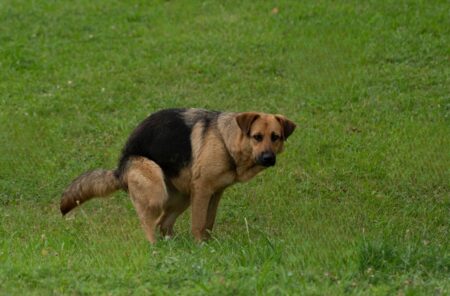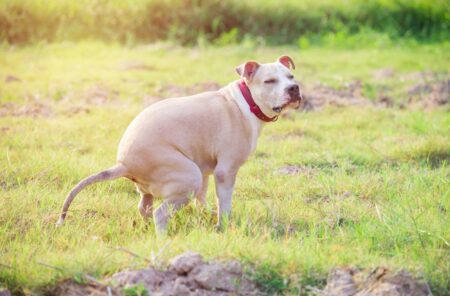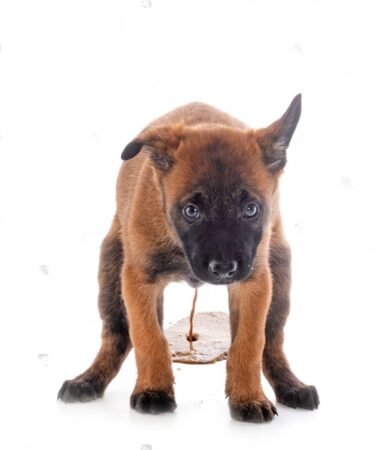Bloody Diarrhea In Dogs, Causes And Treatment
Bloody Diarrhea in dogs is a very serious condition that should be addressed immediately. It is characterized by the presence of bright red or dark red blood in the stool and is often accompanied by other symptoms such as abdominal pain, fever, vomiting, dehydration, and lethargy. The cause of this condition will vary depending on the underlying cause, as it can be caused by a number of different factors. It is important to take your dog to the veterinarian if you notice any signs of Bloody Diarrhea as this could signal a serious medical issue. Treatment will depend on the underlying cause but can include dietary changes, medications, and even surgery.
Bloody Diarrhea In Dogs, Causes And Treatment
Bloody diarrhea in dogs is a condition in which the stool contains red or dark blood. This can cause the stools to be dark red or black and may also contain undigested food particles. The blood can come from the dog’s rectum or lower sections of the digestive tract.
Common causes of bloody diarrhea in dogs include infection with bacteria, viruses, or parasites, the ingestion of foreign objects, antibiotic-associated diarrhea, or intense stress from events such as a change of diet or illness in another pet. In some cases, the cause may not be easily identified.
Treatment will depend on the cause of bloody diarrhea but may include antibiotics, medications to stop vomiting, fluid therapies, or hospitalization. In cases of foreign object ingestion, surgery may be necessary. In other cases, dietary changes may be recommended or a special diet may be prescribed. If the cause of the bloody diarrhea is not immediately clear, a complete diagnostic workup may be necessary to identify the underlying cause and the proper treatment.
SEE ALSO: Golf Ball-Sized Lump On Dog’s Neck: Causes And Treatment
Is Bloody Diarrhea In Dogs An Emergency?
Yes, bloody diarrhea in dogs can signal a medical emergency so it is important to contact a veterinarian to have your dog assessed and get proper treatment.
Bloody Diarrhea In Dogs
Bloody diarrhea in dogs is a condition that is characterized by the presence of bright red, or sometimes dark red or even black, blood mixed in with, or completely replacing the normal feces. The result can be a very worrying sight for the dog’s owners and can be caused by a variety of different issues. The most common causes are dietary indiscretion, viral or bacterial infections, parasites, inflammation, medications, or more serious diseases such as cancer or liver or kidney failure. It is important to take your dog to the vet for a full check-up as soon as possible if you notice it has bloody diarrhea in order to identify and treat the underlying cause.
Natural Remedies For Bloody Diarrhea In Dogs
- Ginger: Ginger is thought to help reduce inflammation in the intestinal tract and may reduce the severity of bloody diarrhea. Boil about 1-2 teaspoons of crushed ginger in 1 cup of water for 10 minutes, and let cool before giving your pet.
- Yogurt: Yogurt is high in probiotics, helping to restore balance to the digestive system. Look for a yogurt that does not have added sugars. Give it to your dog as a treat or mix it into food.
- Coconut Oil: Coconut oil can help improve digestion and reduce inflammation associated with bloody diarrhea. give one teaspoon to dogs under 15 pounds, and up to one tablespoon per 25 pounds of weight.
- Apple Cider Vinegar: Apple cider vinegar is known to have antibacterial and anti-inflammatory properties that can help reduce inflammation and relieve symptoms of bloody diarrhea. Give 1 teaspoon per 25 pounds of weight.
- Slippery Elm: Slippery elm is a natural remedy with mucilaginous properties that help soothe and coat the digestive system. Mix one teaspoon into your dog’s food each day.
- Home-cooked Diet: Give your dog a temporary home-cooked diet, such as boiled chicken and rice, to give their digestive system a rest. Avoid fatty foods, onions, garlic, and other foods that are difficult to digest.
Dog Has Bloody Diarrhea But Acting Normal
If your dog has bloody diarrhea but is otherwise acting normally, it is important to take him to the vet as soon as possible to assess the cause and initiate treatment. Blood in the stool is often an indication of a fairly serious underlying condition such as an infection, gastrointestinal disease, or toxin ingestion. Early medical intervention is essential to ensure your dog’s health and well-being and to prevent further complications.
Old Dog Bloody Diarrhea
If your old dog is having bloody diarrhea, you should take them to your veterinarian as soon as possible. This could be a sign of a serious underlying condition, such as an intestinal infection, intestinal parasites, or cancer. Your veterinarian will do a physical exam and run some tests to determine the cause of the diarrhea. To treat the condition, your veterinarian may prescribe medication, recommend dietary changes, or perform surgery.
8 Week Old Puppy Blood In Stool
If your 8-week-old puppy is experiencing blood in the stool, it is important to take the pup to the vet as soon as possible. Blood in the stool of puppies can be caused by a variety of conditions ranging from parasites to serious illnesses. It is important to take the puppy to the vet so that proper diagnosis and treatment can be made.
Dog Diarrhea With Blood And Mucus
Dog diarrhea with blood and mucus can be caused by a variety of medical issues, some of which can be serious and require immediate veterinary attention. Causes may include irritation or inflammation of the lining of the intestines (enteritis or colitis) due to dietary indiscretion, parasites (including whipworms, hookworms, roundworms, and whipworm eggs), bacterial or viral infections (such as parvovirus or canine distemper), ingestion of toxins and poisons, ingestion of foreign objects, canine pancreatitis, inflammatory bowel disease, or cancer. Depending on the cause, treatment may involve antibiotics, dietary changes, medications, or surgery. If your pet is experiencing diarrhea with blood and mucus, it is important to take them to the veterinarian for a thorough examination in order to determine the cause and begin appropriate treatment.
Causes of Bloody Diarrhea in Dogs
- Bacterial Infection: Bacterial infections, such as salmonella, E.coli, or campylobacter, can all cause dogs to have bloody diarrhea. Bacterial infections can be contracted from eating contaminated food, drinking contaminated water, and contact with other animals carrying the same infection.
- Parasites: Parasites, such as roundworms, hookworms, whipworms, and giardia, can also cause symptoms of bloody diarrhea in dogs. These parasites are spread by ingesting contaminated water or grass.
- Diet: Rapid dietary changes can also result in bloody diarrhea in dogs. If a dog’s diet is changed too quickly, it can cause stress on the digestive system and result in bloody diarrhea.
- Stress: Stress is also known to cause a dog’s digestive system to become compromised. Increased stress levels can cause dogs to have digestive issues, including bloody diarrhea.
- Toxin Ingestion: If a dog ingests toxins, such as antifreeze, lilies, or chocolate, it can cause severe digestive issues. These types of toxins can cause severe dehydration, vomiting, and bloody diarrhea.
How To Recognize If Your Dog’s Diarrhea Is Serious Or Not
If your dog has diarrhea for more than a few days, it’s time to take your pup to the veterinarian. Diarrhea can be indicative of an underlying health problem, such as irritable bowel syndrome, infection, parasites, food intolerance, or reactions to medications. Additionally, if your pet experiences any of the following symptoms alongside diarrhea, it could be a sign of a more serious problem:
- Blood in the diarrhea
- Increased frequency of bowel movements
- Pain or straining when trying to defecate
- Fever
- Lethargy or weakness
- Vomiting
- Abdominal discomfort
- Loss of appetite
- Weight Loss
If your dog experiences any of these symptoms, take him to the vet immediately. The sooner any underlying issues are identified and treated, the better outcome for your pup.
Dog Bloody Diarrhea Treatment
Bloody diarrhea in cats can be caused by a variety of conditions and should be treated depending on the underlying cause.
If the bloody diarrhea is caused by an infectious agent, antibiotics may be prescribed. Underlying conditions such as inflammatory bowel disease may be managed with anti-inflammatory medications such as steroids or immune suppressants.
If the bloody diarrhea is due to an intestinal parasite, anti-parasitic medications such as fenbendazole, pyrantel pamoate, or metronidazole may be prescribed. It is important to treat any concurrent infections at the same time as the parasite infestation.
In some cases, supportive care such as proper diet and fluid therapy may also be needed to help facilitate recovery. Additional treatments, such as dietary modifications, may also be necessary in order to address any underlying conditions.
If bloody diarrhea persists despite proper treatment, it may be a sign of a more serious condition and your vet should be consulted.
How Do You Treat Blood in Dogs Stool Naturally?
- Improve diet: Feed your dog a high-quality, well-balanced, and species-appropriate diet. Include more fresh foods, such as raw meats, fruits, and vegetables, and avoid processed and canned pet foods.
- Add probiotics: Probiotics can help restore the balance of good gut flora in your dog’s digestive tract and help reduce inflammation and irritation.
- Increase fiber: Increase the fiber content of your dog’s diet to help improve stool consistency and reduce the risk of inflammation in the intestines. Increase fiber gradually to allow your dog’s digestive system to adjust.
- Use herbs: Some herbs, such as slippery elm, marshmallow root, licorice root, and plantain, can be used to help soothe the digestive tract and reduce inflammation.
- Try digestive enzymes: Digestive enzymes may help improve the digestion of food and reduce the amount of irritation and inflammation in the intestines.
- Add omega-3 fatty acids: Fish oil supplements may help reduce inflammation in the intestines.
What To Feed A Dog With Bloody Stool
Generally, a bland diet works best for dogs with bloody stools. This diet typically consists of a cooked protein (such as boiled chicken, turkey, or lean ground beef), a bland carbohydrate (such as white rice, oats, or barley), and a source of beneficial bacteria (such as plain yogurt or an off-the-counter probiotic). Treats should be limited to low-grain options like boiled vegetables, cooked eggs, and strips of boiled meat. A bland diet can help soothe sensitive stomachs and reduce irritation that may be causing the blood in the stool. If your pet just isn’t enthused about your cooking, there are also commercial bland diets formulated specifically for this purpose.
Preventing Bloody Diarrhea in Dogs
- Ensure your dog is receiving all necessary vaccines and check-ups. Consult with your veterinarian to make sure your dog is up to date on all necessary vaccinations.
- Provide your dog with a healthy, balanced diet. Offer healthy, quality food that provides the right balance of nutrients. This will help keep the digestive system functioning optimally.
- Avoid giving your dog table scraps. Some types of table scraps may contain ingredients that are difficult for your dog to digest.
- Monitor your dog’s health closely. Watch for any changes in your dog’s behavior, such as diarrhea or vomiting, and contact your veterinarian if you notice any of these symptoms.
- Clean up after your dog regularly. Make sure to pick up any feces quickly. This will help to prevent the spread of parasites or other bacteria that can cause bloody diarrhea.
SEE ALSO: Can Dogs Eat Dill Pickles?
FAQ
Q. What can I give my dog for bloody diarrhea?
A. The first step in treating bloody diarrhea in dogs is to consult a veterinarian, as the cause is often something serious such as parasites or bacterial infection. Treatment could involve antibiotics, deworming, a special diet, or fluid therapy. Avoid feeding your dog any people’s food and provide plenty of fluids to replace electrolytes.
Q. Can bloody diarrhea in dogs go away on its own?
A. Yes, in some cases bloody diarrhea in dogs can go away on its own. However, it is important to consult with a veterinarian as bloody diarrhea can be an indicator of serious health issues, such as intestinal infection, parasites, or dietary intolerance. Your veterinarian will be able to diagnose the underlying cause of the symptoms and offer the best treatment options for your pet.
Q. Will antibiotics help bloody diarrhea dogs?
A. Antibiotics may help treat a dog’s bloody diarrhea if the condition is caused by an infection. However, the diagnosis of the underlying cause should be made by a veterinarian. In some cases, other treatments such as changing the diet or anti-diarrheal medications may be necessary.
Conclusion
In conclusion, bloody diarrhea in dogs is a very serious condition that can be caused by any number of things, from viruses and parasites to bacterial infections and dietary issues. Regardless of the cause, it is important to see a veterinarian for a proper diagnosis and treatment plan as soon as possible. Treatment options for bloody diarrhea include medications, such as antibiotics and anti-diarrheal agents, fluid therapy, dietary changes, and probiotics. Careful monitoring is also necessary to ensure the condition is properly managed and treated.


